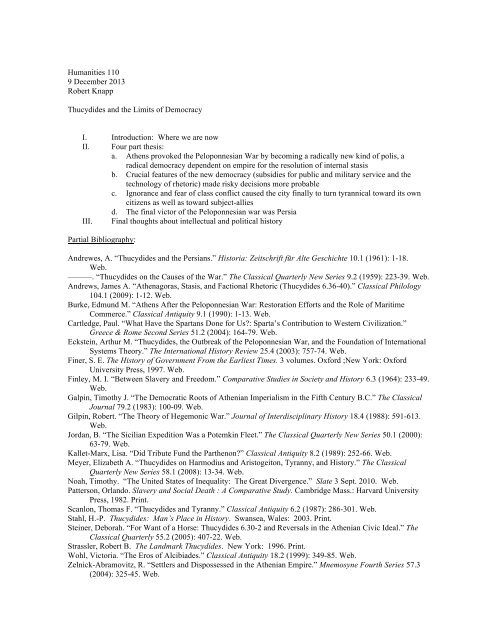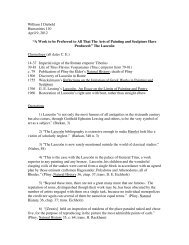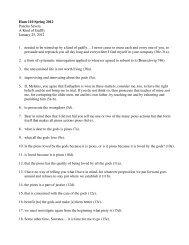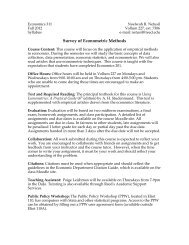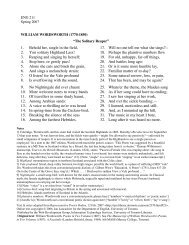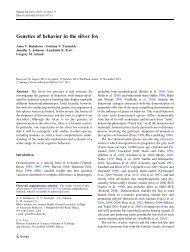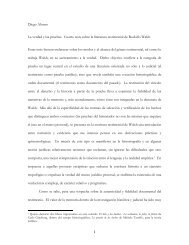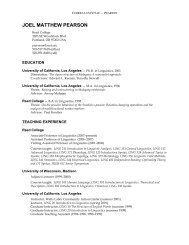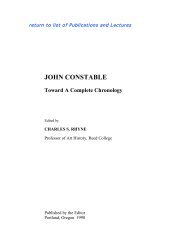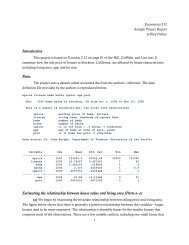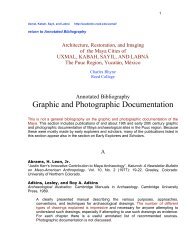Lecture Handout
Lecture Handout
Lecture Handout
Create successful ePaper yourself
Turn your PDF publications into a flip-book with our unique Google optimized e-Paper software.
Humanities 110<br />
9 December 2013<br />
Robert Knapp<br />
Thucydides and the Limits of Democracy<br />
I. Introduction: Where we are now<br />
II. Four part thesis:<br />
a. Athens provoked the Peloponnesian War by becoming a radically new kind of polis, a<br />
radical democracy dependent on empire for the resolution of internal stasis<br />
b. Crucial features of the new democracy (subsidies for public and military service and the<br />
technology of rhetoric) made risky decisions more probable<br />
c. Ignorance and fear of class conflict caused the city finally to turn tyrannical toward its own<br />
citizens as well as toward subject-allies<br />
d. The final victor of the Peloponnesian war was Persia<br />
III. Final thoughts about intellectual and political history<br />
Partial Bibliography:<br />
Andrewes, A. “Thucydides and the Persians.” Historia: Zeitschrift für Alte Geschichte 10.1 (1961): 1-18.<br />
Web.<br />
———. “Thucydides on the Causes of the War.” The Classical Quarterly New Series 9.2 (1959): 223-39. Web.<br />
Andrews, James A. “Athenagoras, Stasis, and Factional Rhetoric (Thucydides 6.36-40).” Classical Philology<br />
104.1 (2009): 1-12. Web.<br />
Burke, Edmund M. “Athens After the Peloponnesian War: Restoration Efforts and the Role of Maritime<br />
Commerce.” Classical Antiquity 9.1 (1990): 1-13. Web.<br />
Cartledge, Paul. “What Have the Spartans Done for Us?: Sparta’s Contribution to Western Civilization.”<br />
Greece & Rome Second Series 51.2 (2004): 164-79. Web.<br />
Eckstein, Arthur M. “Thucydides, the Outbreak of the Peloponnesian War, and the Foundation of International<br />
Systems Theory.” The International History Review 25.4 (2003): 757-74. Web.<br />
Finer, S. E. The History of Government From the Earliest Times. 3 volumes. Oxford ;New York: Oxford<br />
University Press, 1997. Web.<br />
Finley, M. I. “Between Slavery and Freedom.” Comparative Studies in Society and History 6.3 (1964): 233-49.<br />
Web.<br />
Galpin, Timothy J. “The Democratic Roots of Athenian Imperialism in the Fifth Century B.C.” The Classical<br />
Journal 79.2 (1983): 100-09. Web.<br />
Gilpin, Robert. “The Theory of Hegemonic War.” Journal of Interdisciplinary History 18.4 (1988): 591-613.<br />
Web.<br />
Jordan, B. “The Sicilian Expedition Was a Potemkin Fleet.” The Classical Quarterly New Series 50.1 (2000):<br />
63-79. Web.<br />
Kallet-Marx, Lisa. “Did Tribute Fund the Parthenon?” Classical Antiquity 8.2 (1989): 252-66. Web.<br />
Meyer, Elizabeth A. “Thucydides on Harmodius and Aristogeiton, Tyranny, and History.” The Classical<br />
Quarterly New Series 58.1 (2008): 13-34. Web.<br />
Noah, Timothy. “The United States of Inequality: The Great Divergence.” Slate 3 Sept. 2010. Web.<br />
Patterson, Orlando. Slavery and Social Death : A Comparative Study. Cambridge Mass.: Harvard University<br />
Press, 1982. Print.<br />
Scanlon, Thomas F. “Thucydides and Tyranny.” Classical Antiquity 6.2 (1987): 286-301. Web.<br />
Stahl, H.-P. Thucydides: Man’s Place in History. Swansea, Wales: 2003. Print.<br />
Steiner, Deborah. “For Want of a Horse: Thucydides 6.30-2 and Reversals in the Athenian Civic Ideal.” The<br />
Classical Quarterly 55.2 (2005): 407-22. Web.<br />
Strassler, Robert B. The Landmark Thucydides. New York: 1996. Print.<br />
Wohl, Victoria. “The Eros of Alcibiades.” Classical Antiquity 18.2 (1999): 349-85. Web.<br />
Zelnick-Abramovitz, R. “Settlers and Dispossessed in the Athenian Empire.” Mnemosyne Fourth Series 57.3<br />
(2004): 325-45. Web.
Terms: thetes, chora, herms (ithyphallic)<br />
Quotations:<br />
1. As soon as it was day Nicias put his army in motion, pressed as before, by the Syracusans and their<br />
allies, pelted from every side by their missiles and struck down by their javelins. The Athenians<br />
pushed on for the [river] Assinarus, impelled by the attacks made upon them from every side by a<br />
numerous cavalry and the swarm of other arms, supposing that they should breathe more freely if<br />
once across the river, and driven on also by their exhaustion and craving for water. Once there they<br />
rushed in, and all order was at an end, each man wanting to cross first, and the attacks of the enemy<br />
making it difficult to cross at all; forced to huddle together, they fell against and trampled one another,<br />
some dying immediately upon the javelins, others getting entangled together and stumbling over the<br />
articles of baggage, without being able to rise again. Meanwhile the opposite bank, which was steep,<br />
was lined by the Syracusans, who showered missiles down upon the Athenians, most of them<br />
drinking greedily and heaped together in disorder in the hollow bed of the river. The Peloponnesians<br />
also came down and butchered them, especially those in the water, which was thus immediately<br />
spoiled, but which they went on drinking just the same, mud and all, bloody as it was, most even<br />
fighting to have it. (Thucydides 7.84, trans. Richard Crawley, rev. by Strassler)<br />
2. What made the Peloponnesian War inevitable was the growth of Athenian power, and the fear which<br />
this caused in Sparta. (Thucydides 1.23, trans. Rex Warner) I think the truest cause, though least<br />
spoken of, was that the Athenians, in growing to great power and furnishing an occasion of fear to the<br />
Lacedaemonians, compelled the latter to go to war (Thucydides 1.23, trans. Raphael Sealey, rev. by<br />
Arthur Eckstein)<br />
3. In the passage of greatest relevance here, 1.23.5-6, Thucydides' summary of the causes of the war<br />
between Athens and Sparta appears to stress-- to the delight of political scientists--the crucial role of<br />
a power-transition crisis. Political scientists define such a crisis as a response to a perceived dramatic<br />
shift in the distribution of the capabilities of the states within an anarchic system. The shift can either<br />
take the form of a dramatic increase in the capabilities of one of the major units in the system, and/or<br />
a dramatic decline in the capabilities of another major unit, either in absolute or relative terms. When<br />
the distribution of privilege, influence, and territory within a state system becomes severely<br />
mismatched with changing realities of power, the result tends to be large-scale, often system-wide,<br />
war that in turn creates a new configuration of privilege, influence, and territory better matched with<br />
the distribution of power. In other words, historically the realignment of the structure of power and<br />
privilege within an anarchic state system has tended to be accompanied by great violence: what the<br />
political scientists call 'hegemonic war'. (Eckstein 758-59)<br />
4. With the Greeks we enter a new world. . . . No less than anything else, perhaps more so, the Greeks<br />
affected the practice and the theory of government. What they worked here was a revolution. From<br />
the beginning of recorded history in Sumeria and Egypt—for some two-and-a-half thousand years—<br />
every constituted state had been a monarchy: not only in the known world of the Middle East and<br />
eastern Mediterranean, but in the worlds of India and distant China too. These monarchs had all been<br />
absolute, and godlike too, except for the Jewish kingdom where God ruled the kings. Suddenly there<br />
was government without kings or god. Instead, there were man-made, custom-built republics of<br />
citizens. These Greek polities speak to us in a modern idiom . . . . (Finer, Vol. I, 316)<br />
5. At least the people think themselves worthy of taking money for singing, running, dancing, and<br />
sailing in ships, so that they become wealthy and the wealthy poorer. . . . they realize that the ruler is<br />
necessarily hated by the ruled and that if the rich and aristocratic men in the cities are strong, the rule<br />
of the people at Athens will last for a very short time. This is why they disfranchise the aristocrats,<br />
take away their money, expel and kill them, whereas they promote the interests of the lower class. . . .<br />
Someone might say that the Athenians' strength consists in the allies' ability to pay tribute-money; but<br />
the rabble thinks it more advantageous for each one of the Athenians to possess the resources of the<br />
allies and for the allies themselves to possess only enough for survival and to work without being<br />
able to plot defection. (Constitution of the Athenians 15-16)<br />
6. There is no document of civilization that is not at the same time a document of barbarism. (Walter<br />
Benjamin)


